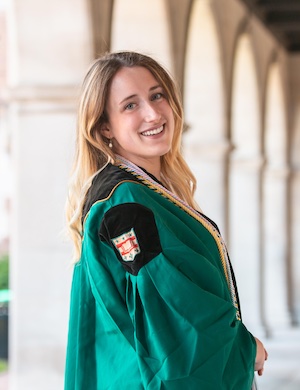By Chloe White
It was a chilly Monday afternoon, and everything felt heavy. My last complete week of undergrad had just begun, and the gravity of its finality weighed on me as I trudged from Washington University’s campus to my apartment four blocks north. My thesis defense was scheduled for the following Monday, its impending date looming. I kept imagining questions from my committee that I would be unable to answer, afraid that a pandemic education had stunted my capacity to think on my feet. I ruminated on the fact that my thesis would be the only thing I had to show for my final year of college; as we all hunkered down and waited for the storm to pass, the only thing I could safely do was research.
One could argue this was a blessing in disguise. Had the year been “normal,” I might not have even applied for the thesis program. I had so many other things going on – leadership roles, comedy groups, an on-campus job – that my actual classes often fell to the wayside. I was good at school, and I loved school, but it wasn’t everything to me. Though I had left Washington University in the spring of 2020 to study abroad at the University of Oxford, I was certain that my life would return to normal upon my return to campus in the fall.
Then, two months into my time at Oxford, I got the email: “Suspension of the program – please read!”
I re-read the subject line three times before I even began to process it. My semester abroad was over. We had to leave. Covid-19 had arrived, and no one knew what to do.
I was devastated. Oxford had made me care about learning in a way that I had never cared before. I was supposed to spend the following six weeks working on an independent research project, pulling books from the shelves of the Bodleian library, devouring them in its hallowed halls. Now, my research would be from my laptop in my childhood bedroom.
Despite the unforeseen circumstances of my researching, I grew to love it. I transcribed scans of eighteenth-century documents, watching the past come to life around me at my parents’ dining room table. In the early days of the pandemic, these were the only things keeping me connected to the outside world. This Oxford research became the foundation of my thesis research, which propelled me through my senior year. When the world outside seemed bleak, it gave me something to care about.
Suddenly, in the blink of an eye, my defense was in exactly one week away. Despite my preparation, I had immense self-doubt. Trekking back to my apartment, I kept asking myself, “What if I fail?”
And then I got the email: “Congratulations on your selection to Phi Beta Kappa!” I re-read that subject line three times, too, and began crying in the street. After so much doubt, I felt like, maybe, I was good enough, smart enough, deserving enough of success. That the past four years of college had meant something more than essays and exams and club meetings.
A week later, I confidently entered the Zoom room for my defense. I answered my committee’s questions with a conviction of my own intelligence. And, ultimately, I passed.
Chloe White is a 2021 Washington University Phi Beta Kappa inductee. The essay above is the winner of this year’s PBKNY Essay Contest. Washington University is home to the Beta of Missouri chapter of Phi Beta Kappa.




